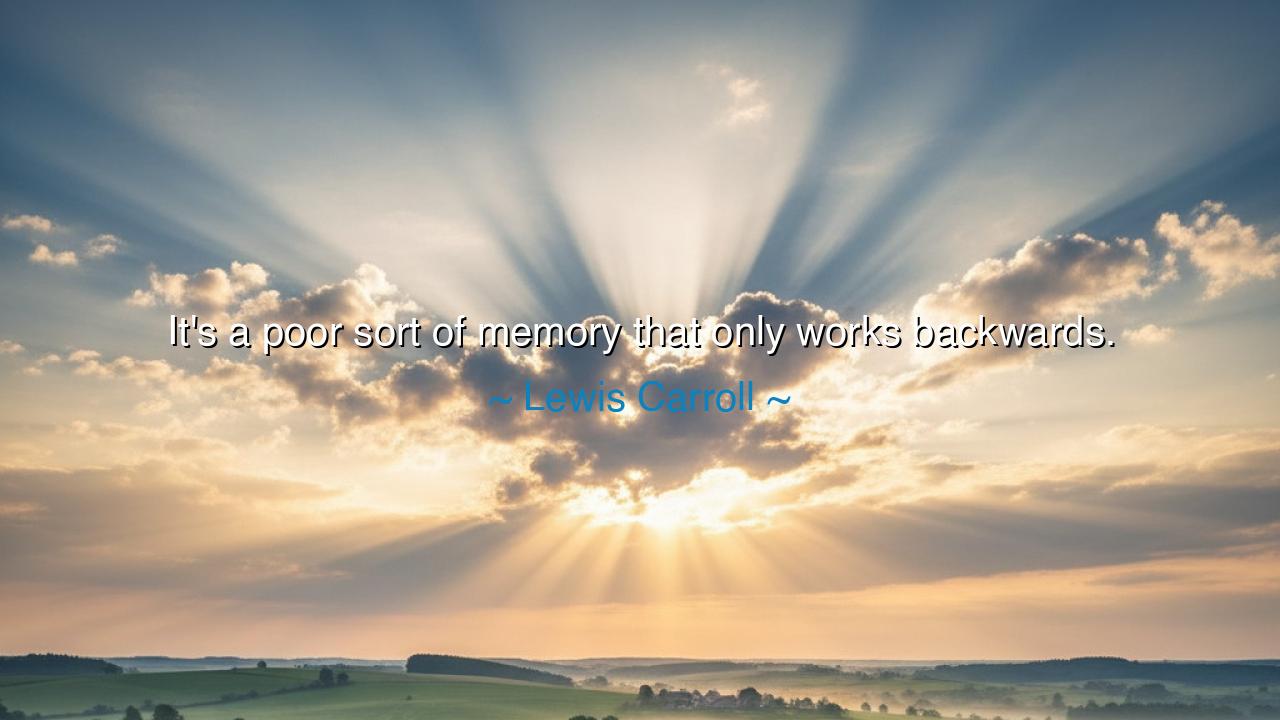
It's a poor sort of memory that only works backwards.






“It’s a poor sort of memory that only works backwards.” So spoke Lewis Carroll, the conjurer of wonderlands and dream-worlds, yet beneath his whimsy lay the wisdom of the ancients. For this saying, wrapped in the playfulness of his mind, carries a truth that echoes through the corridors of time: memory, noble though it is, should not be a chain that binds us to what has been, but a lamp that guides us toward what may yet be. To remember only backwards is to live as a shadow among the living—to be trapped in what is gone, blind to what might come.
The mind of man was never meant to be a museum of relics alone. It was built as a forge, where the fragments of the past are melted and reshaped into the tools of the future. The wise remember forward as well as backward. They look upon their yesterdays not as prisons, but as seeds. The past must not weigh upon the spirit like an anchor, but serve as wind filling the sails of destiny. The poor memory is the one that recalls but never reimagines; the rich memory is that which transforms recollection into prophecy.
Consider Thomas Edison, the man who lit the darkness of the world. He failed more than a thousand times before the light bulb’s filament shone steady. Yet to him, each failure was not a chain to the past, but a step toward the future. His memory worked forward—he did not recall mistakes merely to lament them, but to learn, refine, and rise. Thus, his remembrance became motion, not mourning; creation, not complaint. So should our memories serve us: not as tombstones of regret, but as milestones of becoming.
In truth, memory and imagination are sisters, born of the same mother—the soul’s longing to make sense of time. The one gathers what has been; the other breathes life into what could be. When they work together, mankind rises to greatness. But when memory serves only the past, the heart grows weary, burdened by loss. Nations that remember only backward become haunted by old wounds; men who remember only backward cannot forgive themselves. Yet those who remember forward—who use remembrance to build compassion, courage, and vision—become the architects of new worlds.
The ancients taught that time is a circle, not a line. What we call “future” is but the return of what we have yet to understand from our past. Thus, the wise one contemplates not how to escape memory, but how to awaken it in new directions. Recall not only what happened, but what it means, what it teaches, what it can still become. The past is clay; the hands of the living must shape it anew each day.
Let no one say, “I cannot change; it has always been so.” For that is the speech of a slave to backward memory. The free man, the noble woman, says instead, “I remember what was, so I may create what shall be.” They use the past not to remain bound by it, but to transform its energy into wisdom. Just as a river remembers its source even as it seeks the sea, so must our minds remember with purpose—to flow onward, not stagnate.
And so, dear listener, the lesson is this: remember forward. When pain revisits you, ask not “Why did it happen?” but “What may I do now with this knowing?” When joy passes, let it teach you how to create more of its kind. When failure comes, remember not the fall but the hand that steadied you. Memory is sacred, but only when it breathes. Let your remembrance be alive, fluid, and creative. Do not dwell in the ashes; use them to kindle tomorrow’s fire.
For in the end, the greatest memory is not the one that holds the past most clearly, but the one that transforms it into hope. To remember forward is to defy time itself—to take yesterday’s fragments and build from them a brighter dawn. And that, child of tomorrow, is the truest act of genius: to make remembrance the servant of destiny, not its master.






AAdministratorAdministrator
Welcome, honored guests. Please leave a comment, we will respond soon